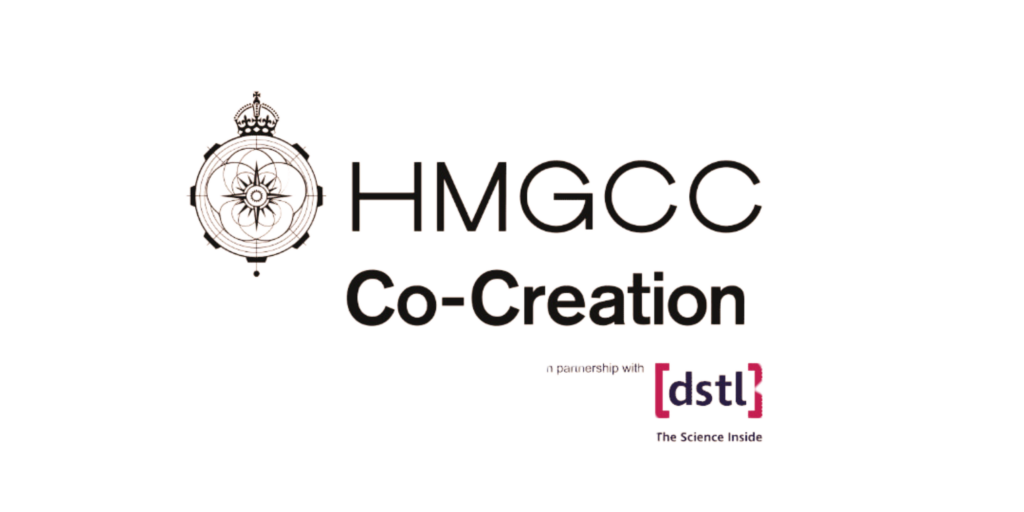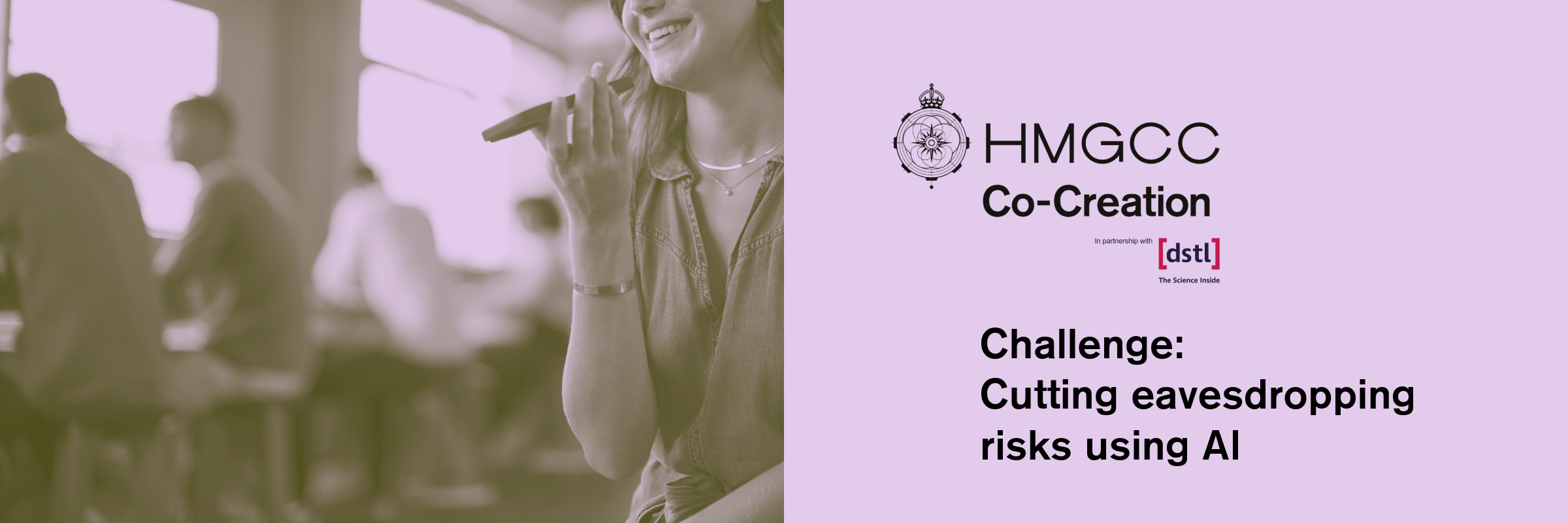
UK government offices often host sensitive conversations, and it is important to ensure that these are not under threat from accidental or nefarious eavesdropping attempts.
These risks are continually assessed due to the high pace of change in technology. In its latest challenge, HMGCC Co-Creation wants to hear from organisations developing artificial intelligence / machine learning techniques that provide advanced noise cancellation to help us understand what is now possible and to test in a government office scenario.
Organisations are being asked to apply if, over a 12-week period, they can develop and demonstrate technology to meet this challenge, HMGCC Co-Creation will provide funding for time, materials, overheads and other indirect expenses.
The challenge
Context
Government offices are often found in multi-occupancy buildings and open plan offices. All offices are designed to National Protective Security Agency specifications, to ensure a standard in physical and cyber protection. But there is more to learn. Understanding risk in this type of working environment is an important function. If there is an opportunity for eavesdropping, either accidentally or by a nefarious party, we would like to understand how challenging it would be to cancel out the irrelevant ambient noise to focus in on the conversation of significance. The latest challenge launched by HMGCC Co-Creation sets out to understand the threat of third parties using artificial intelligence (AI) / machine learning (ML) to cancel out randomised and unwanted noise.
The gap
Within office environments, there is a general noise from heating, ventilation, air conditioning systems (HVAC), desk fans, doors closing and background conversations. All of this constitutes random noise generation. What is already known about how to cancel this noise out? Digital signal processing with adaptive filtering is well known. We want to know more about the threat of cutting-edge methods to increase signal to noise ratios, used to focus on specific conversations. There has been a rapid rise in recent years of AI and ML adoption in most sectors. There has also been interest and advanced research into using deep learning and neural networks to provide real-time noise cancellation. HMGCC Co-Creation is now seeking to better understand the threat through testing advanced noise cancellation capabilities.
Example use case
Government employee Sam is having a private call in an office booth. The booth is open but designed to dampen leaking sound to the external office. For other office users standing close by there is limited sound leakage, so Sam’s conversation can stay private. The outer area of the office is open plan and there are various online calls happening, as well as general office noise. Shauna is a few metres away from Sam, using her phone. The phone is picking up all the audio in the room but with the general office noise, Sam’s conversation is unlikely to be recorded to an intelligible level, whether the audio was picked up accidentally (over a phone call) or nefariously (by taking an active recording). If audio was downloaded from Shauna’s phone, there are existing software packages that could be used to remove background noise. However, the following points should be considered:
• Software packages are typically focused on the commercial market, such as podcasting, music recording, and online calls, where there is a controlled and predictable environment of microphone placement and high signal to noise ratio.
• Software packages are unlikely to filter between other less sensitive conversations in the office and focus on Sam’s private conversation.
• Shauna’s microphone is dynamic, she may decide to sit in a different area or move about, all while still picking up audio. Shauna’s phone contains a single microphone, not an array of microphones.
In this scenario, it is highly unlikely that Sam’s conversation could be intelligibly intercepted from Shauna’s phone even with modern post processing techniques. But could advances in AI / ML audio processing pose more risks?
Project scope
HMGCC Co-Creation would like to team up with organisations developing AI / ML noise cancellation that could be used in busy office environments to focus in on specific conversations. This is to enable better understandings of future threats through demonstration. Applications to this challenge should already be developed to a mid-Technology Readiness Level (TRL). During this project the HMGCC Co-Creation team can provide limited test data and, at the close of the project, intend to take the developed software and test within a representative lab environment. The deliverable at the end of a 12-week project should be test results, a report, software that HMGCC Co-Creation can further test and a pathway to further development if more funding is made available.
Considerations for a proposal:
• AI / ML algorithm tested against random (rather than pseudo-random) noise generation.
• Test against non-repetitive speech.
• To understand the theoretical limits of signal to noise ratio in decibels (dB), where the AI / ML code stops working effectively.
• The system would be expected to deliver intelligible speech at very low signal to noise ratios.
• The report and testing should outline signal-to-noise ratio improvement (in dB) across a range of input signal to noise ratios.
• Due to project duration, it is unlikely that there is time for significant model training.
• The software should have the facility to be trained by the end user to optimise performance with their own noise source.
The proposed solution should not be:
• Based solely upon adaptive filtering.
• Horizon scanning.
Key dates
10 October
Competition opens.
24 October
Deadline for clarifying questions.
29 October
Clarifying questions published.
07 September
Competition closes.
20 November
Applicants notified.
28 November
Pitch day in Milton Keynes.
6 January 2025
Target project kick off.
Eligibility
This challenge is open to sole innovators, industry, academic and research organisations of all types and sizes. There is no requirement for security clearances.
Solution providers or direct collaboration from countries listed by the UK government under trade sanctions and/or arms embargoes are not eligible for HMGCC Co-Creation challenges.
DOCUMENTS AND LINKS
For further information including routes to apply, HMGCC Co-Creation terms and conditions and FAQs.
